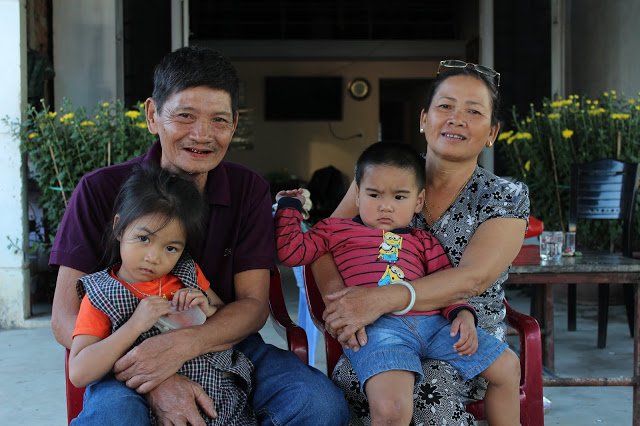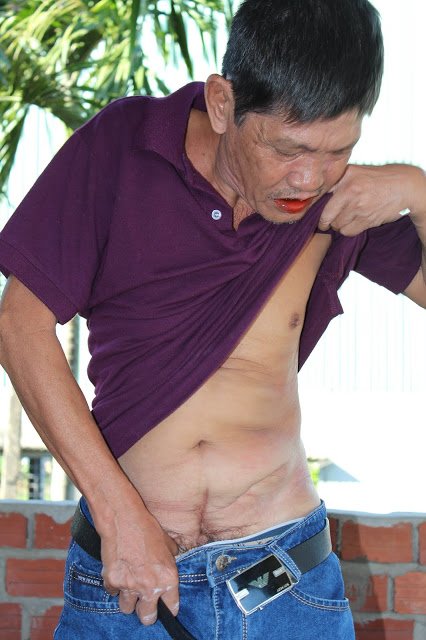Precursor to the Mỹ Lai Massacre: 1968 Phong Nhị, Phong Nhất_10(3)
Chapter 10(3) : A miraculous survivor, Nguyễn Đức Sang
I interviewed Nguyễn Thị Thanh’s older brother, Nguyễn Đức Sang, twice.
Initially, we spoke on the phone, using an interpreter, in February of 2014. He said it was difficult for him to even attend the commemorative rites of his mother and relatives in their hometown of Phong Nhị because he lives in Ho Chi Minh. Naturally, he didn’t even budge at my offer to pay for a roundtrip flight. The second interview happened coincidentally on February 5, 2017. When I went to meet Nguyễn Thị Thanh at her home in Phong Nhị , he happened to be there.
The second interview was neither a formal nor official interview. It was more like a 30-minute conversation with Thị Thanh and Đức Sang. Đức Sang is seven years older than Thị Thanh. He was 15 years old at the time of the massacre on February 12, 1968. He said that his sister, having been only eight years old at the time, probably does not recall the event as vividly as he does.
That day, four of the six family members who were home were killed (five people, including their neighbor, Trịnh Chờ), and only the two siblings survived, but their scars from the gunshot were severe. Đức Sang’s condition was worse than that of Thị Thanh, who was at least able to walk. Đức Sang on the other hand had to crawl. Đức Sang brought up the story of the kettle. That day, the two went into a house while escaping from the scene. Thị Thanh found a kettle and began drinking straight from the spout until there was no more water left for Đức Sang who was also thirsty. Đức Sang later heard from his doctor that he would’ve died had he drunk that water, because he had shed so much blood and ingesting liquid would have likely caused his organs to burst.

February 5, 2017, Nguyễn Đức Sang (left) with his sister, Nguyễn Thị Thanh, posing with his nephews in front of their Phong Nhị home near the number one national highway. Photograph by humank
Thị Thanh who drank all the water by herself went to go search for her mother and tripped on a rock and fell down. Her innards came spilling out. The two were eventually rescued by a couple of adults who found them. Đức Sang was rescued by a women named Nguyễn Thị Đời (35), who resided in the village, and Thị Thanh by their paternal uncle Nguyễn Xá(30). With their help the two were able to aboard a helicopter and be transported to the hospital in Da Nang.
These are the things that I learned about that day and Đức Sang’s experience from my phone interview with him in February of 2014.
Please tell me what you recall about that day.
“I was 15 years old back then. Even up until three days before the incident, I recall having playful encounters with Korean soldiers. There were always Korean soldiers behind our home. They were short with almond-shaped oriental eyes. They wore camo hats and some kind of mark on their shoulder... something like a tiger or a coconut tree...no, actually, I don’t really remember. Either way, whenever they passed by, we would shake hands and greet each other with our usual ‘hello’s. I was never afraid of them. But that morning, I heard the sound of gunshot, and things changed from there. My family and I went into hiding in our bombshelter, and the Korean soldier who intruded through that back door pointed their guns into our hideout. They ordered for us to hurry out and stand in a line. They poured out their bullets on us.”
A miraculous story of survival
“My sister and I were shot, but we didn’t die. We crawled, hiding whenever we spotted a Korean soldier and then resuming to crawl. When I was so exhausted that I couldn’t continue anymore, my sister said to me, `Just a little bit more, Đức Sang. You can’t die.’ We crawled all the way until people found us and helped us onto a helicopter.”
7 years at the hospital until 1975
“Yes, I was discharged from the hospital in Ho chi minh, 10 days before the fall of Saigon, on April 20, 1975. During those seven years, I underwent eleven operations. The surgeries were extremely difficult to withstand. Because I was shot in the stomach, and many of my inner organs were damaged, I was not able to defecate properly; it would come out through my belly button.”
You must have gone to a number of different hospitals
“At first I was at the hospital in Da nang. My sister used the bottom bunk, and I used the top bunk. My condition became more severe, so I was transferred to an American hospital in Tuy Hòa after ten days. A few months later, I was transferred back to Da Nang to a German hospital where I stayed until 1970. After that, I don’t remember the exact region, but I was also at the U.S. 17th hospital ship. Thereafter, with the recommendation of an American doctor, I stayed at a hospital in Ho Chi Minh until 1975. The same doctor also urged me to get treated in the U.S. but I declined.”
When did you find out about your mother’s death?
“I didn’t know even when I was first admitted to the Da nang hospital, or even when I was relocated to Tuy Hòa. When I returned to Da Nang and got on the German hospital ship, there was time I went to our home in Phong Nhị with bandages wrapping my midsection. I found my uncle there, so I asked him if our mom comes by often, and he answered that she doesn’t. That’s when I first heard the news that she passed away. I cried a lot. Our mother worked a lot and she was hardly ever home, so I just naturally assumed she’d be busy working” (he began tearing up).
Who took care of you when you were hospitalized?
“When I was in Da Nang, my uncle and grandmother took turns taking care of me. But after I left for Ho Chi Minh, I didn’t have anybody. The nurses took care of me. I even received allowance. Caregivers of other patients were kind to me as well.
What kind of work do you do currently? “I went back to my hometown in 1975, but returned to Ho Chi Minh a year later. My uncle, who was a policeman, helped me out a lot. I met my wife,Trần Thị Quất(1958~), in 1988 and got married. We have a daughter who now runs a general store.”
How is your condition?
“I’m still in a lot of pain. I can’t carry heavy things. All I could do around the house is some light cleaning.”
Tell me what you can remember about the Korean soldiers
“The only image that has stuck with me is the one wherein the soldier is pointing his gun at us when we were inside the bomb shelter… it still causes me to tremble in fear. When I was at the hospital in Da Nang, the ROK army offered medication to my uncle who was part of the South Vietnamese militia. I didn’t even want to see them because I was scared. I didn’t want to receive any kind of help from them.”
His voice over the phone grew coarser and coarser. It sounded as though thinking of the past stirred up his emotions. Toward the end of the interview, he even seemed annoyed, asking, “Why are you asking so many things?” I could hear his wife on the other end yelling, “Don’t pick up the phone! Hang up!” He sniffled as he asked me not to call him again and hung up.

Nguyễn Đức Sang suddenly got up in the middle of the interview and showed me the scars around his stomach and side. Photograph by humank
Three years later in 2017, when I met Nguyễn Đức Sang in person, he raised his voice again. He became emotionally stirred while talking about how he visited the Phong Nhị and Phong Nhất Massacre memorial service the day before. He began complaining about the Xa People’s Committee for not correcting the miswritten names of his mother and aunt on their cenotaphs next to the banyan tree. The diacritics (accents) were incorrect. He had asked several times already, but nothing had been done to address the issue. The day before at the memorial, a buddhist monk read aloud the names of the victims, but when he read the names of the their mother and aunt, they sounded like somebody else’s names (in Vietnamese, even if spelled the same way, if the diacritics are different, words can take on completely different sounds and meanings). Enraged at the disrespect, Thanh got mad and left for home in the middle of the memorial service.
Đức Sang also mentioned Nguyễn Thị Thanh (at the time 19 years old), who barely stayed alive for a day after her breasts were cut off by Korean soldiers and died in the hospital in Da Nang. He said she was a distant cousin of his wife, Tran Thi Quoc. “She’s 4 years older than I am, but we were very close as we lived very close to each other. We were like siblings. I heard that her five month old sibling was badly injured by Korean soldiers. Although (s)he was the only one who made it alive, (s)he committed suicide by drinking pesticide when (s)he was 10 years old.”
That day, Đức Sang, while talking about being shot, got up all of a sudden and lifted up his shirt and pulled down his pants in order to show me his scar. There were surgical scars below his belly button, sides and buttocks. “I still vividly remember the Korean soldiers shooting their guns and setting the village aflame. I luckily survived.. but life was so hard thereafter that I wanted to die, just like my mother. I often wondered whether continuing to live like this had any meaning.”
- Written by humank (Journalist; Seoul, Korea)
- Translated and revised as necessary by April Kim (Tokyo, Japan)
The numbers in parentheses indicate the respective ages of the people at the time in 1968.
This series will be uploaded on Steemit biweekly on Monday.
Nice job baby